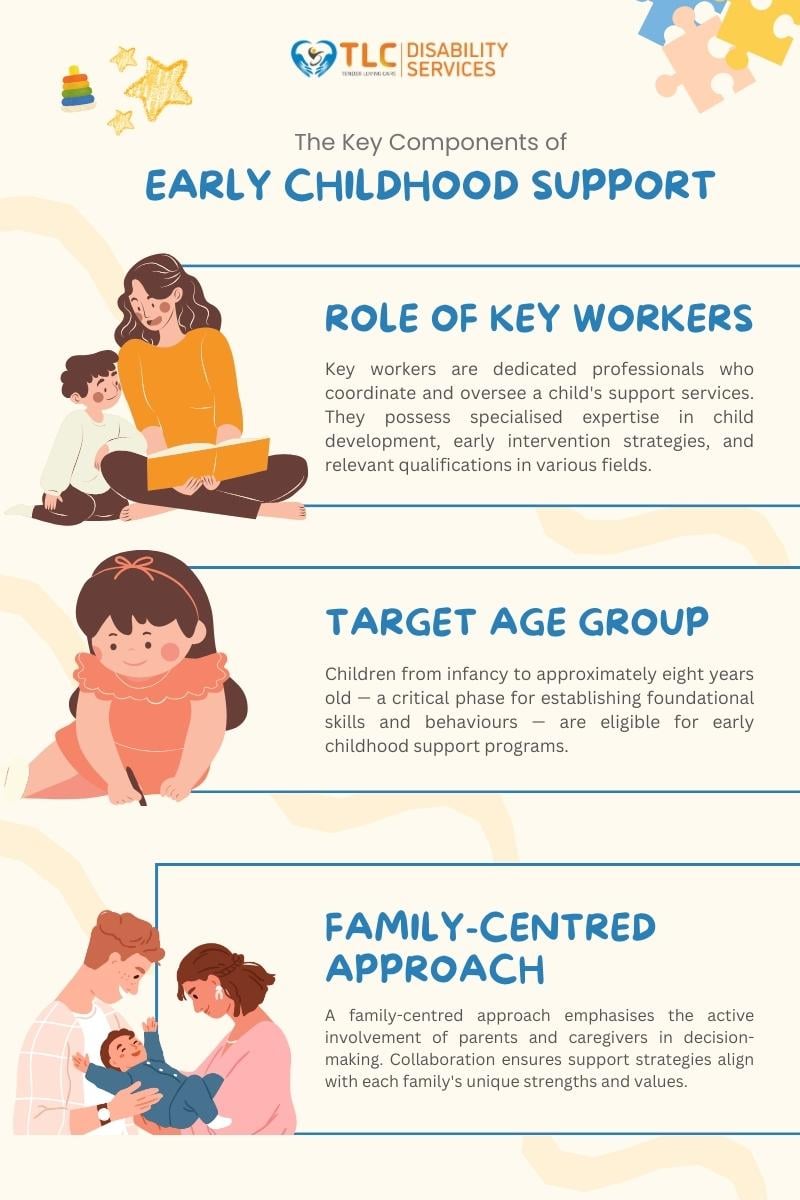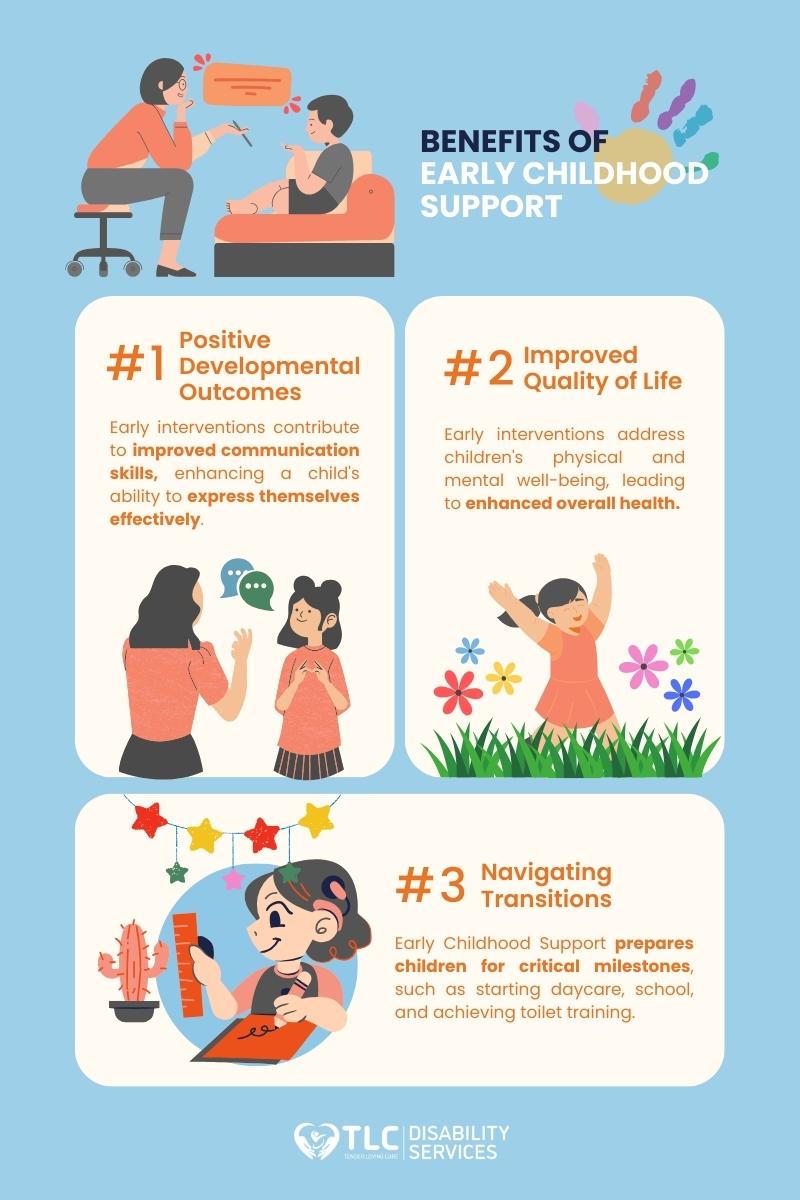In childhood development, early support programs are game changers. They provide specialised assistance during a child’s formative years, tackling diverse developmental needs.
Early intervention is the key to these programs. It means swiftly spotting and dealing with developmental challenges a child might face. This approach recognises the critical period of brain development during a child’s early years, providing them with the best opportunity for success and well-being.

The Key Components of Early Childhood Support
Role of Key Workers
Key workers are dedicated professionals who coordinate and oversee a child’s support services. They possess specialised expertise in child development, early intervention strategies, and relevant qualifications in various fields.
Key workers can be anyone from the range of professionals, such as:
- Early Childhood Teachers: Support learning and development through tailored activities.
- Occupational Therapists: Enhance fine and gross motor skills, sensory processing, and self-care routines.
- Speech Pathologists: Focus on speech, language comprehension, and social communication skills.
- Behavioural Therapists: Address behavioural challenges with evidence-based strategies.
Target Age Group
Children from infancy to approximately eight years old — a critical phase for establishing foundational skills and behaviours — are eligible for early childhood support programs. This period capitalises on rapid brain development and heightened learning capacities, setting the stage for a successful future.
Family-Centred Approach
A family-centred approach emphasises the active involvement of parents and caregivers in decision-making. Collaboration ensures support strategies align with each family’s unique strengths and values, empowering them with knowledge and skills for the child’s growth and development.

Benefits of Early Childhood Support
Positive Developmental Outcomes
Early interventions contribute to improved language and communication skills, enhancing a child’s ability to express themselves effectively. Additionally, they foster elevated cognitive development, sharpening problem-solving and learning capacities.
Targeted assistance helps children develop essential personal care habits, which promotes independence and confidence. Furthermore, these programs improve children’s fine and gross motor skills so they can easily perform various activities.
Improved Quality of Life
These supports address children’s physical and mental well-being, leading to enhanced overall health. Moreover, Early Childhood Support equips children with increased independence and a sense of safety in navigating their surroundings. This, in turn, nurtures self-assurance and a positive outlook on their capabilities. Lastly, tailored support encourages positive social engagement, facilitating the formation of meaningful relationships and interactions.
Navigating Transitions
Early Childhood Support prepares children for critical milestones, such as starting daycare, school, and achieving toilet training. This preparation ensures a seamless transition for the child and their family, easing potential stressors associated with these significant steps in a child’s life.
Early Childhood Supports and NDIS
There is a crucial link between Early Childhood Support and the National Disability Insurance Scheme (NDIS) that makes them work together to help children with disabilities.
NDIS allocates funds based on specific needs, ensuring personalised Early Childhood Support. This connection is crucial for maximising a child’s potential. Navigating the NDIS for Early Childhood Support involves an initial assessment and planning process, determining specific support needs. Families then use allocated funding for tailored services, therapies, and educational support.
Accessing Early Childhood Supports for Non-NDIS Participants
For families not enrolled in the NDIS, connecting with local support services or organisations specialising in early childhood development is the first step. These entities can provide assessments and referrals to suitable services.
Various resources for funding include:
- Community Grants: Local organisations often provide grants or subsidies for early childhood support services. These can be accessed through applications or enquiries.
- Government Programs: Government programs may offer funding or subsidies for early childhood development services. Specific eligibility criteria and application processes may apply.
- Charitable Organisations: Certain charitable organisations focus on supporting children with developmental needs. They may offer grants, scholarships, or subsidies to assist families in accessing necessary services.
By utilising these resources and seeking advice from local support networks, families can take proactive steps towards ensuring their child receives the essential Early Childhood Support they require.
The Lifelong Impact of Early Childhood Supports
This detailed look at Early Childhood Support emphasises how important they are in helping young children grow. Early Childhood Support sets the stage for a successful future through better communication, learning, and independence.
Looking ahead, it’s clear that the benefits last a lifetime. The strong foundation built in these early years helps children as they grow up. Better talking and understanding, quick thinking, and learning to take care of themselves prepare them for a successful life. Plus, making friends and getting ready for changes helps them become strong and prepared for whatever comes their way. Early Childhood Supports aren’t just for now — they’re a key part of a child’s long-term growth and happiness.
